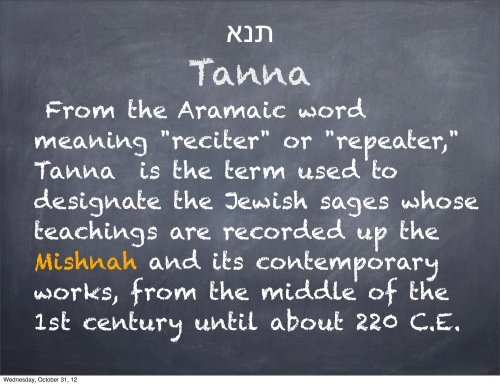Create successful ePaper yourself
Turn your PDF publications into a flip-book with our unique Google optimized e-Paper software.
תנא<br />
Tanna<br />
From the Aramaic word<br />
meaning "reciter" or "repeater,"<br />
Tanna is the term used to<br />
designate the Jewish sages whose<br />
teachings are recorded up the<br />
Mishnah <strong>and</strong> its contemporary<br />
works, from the middle of the<br />
1st century until about 220 C.E.<br />
Wednesday, October 31, 12
תנא<br />
Tanna<br />
Hillel the Elder was one of the<br />
fifth set of Zugot or "Pairs" (30<br />
BCE – 20 CE) <strong>and</strong> was active in<br />
Eretz Yisrael. His student was<br />
Rabbi Yohanan ben Zakkai was a<br />
Tanna of the second generation<br />
(40 – 80 CE) active in Eretz<br />
Yisrael.<br />
Wednesday, October 31, 12
אמורא<br />
Amora<br />
The term used to designate the<br />
rabbis of the fourth to the fifth<br />
centuries whose views are cited in<br />
the Talmud. The word means<br />
"speaker" <strong>and</strong> originally referred to<br />
the members of the academies who<br />
spoke aloud the words of the rabbi<br />
before the public, but it came to<br />
denote the rabbis themselves.<br />
Wednesday, October 31, 12
אמורא<br />
Amora<br />
Rabbi Yehudah Nesi'a (I) was an<br />
Amora of the first generation (220<br />
– 250 CE) active in Eretz Yisrael.<br />
His student was Rabbi Shimon ben<br />
Lakish was an Amora of the second<br />
generation (250 – 290 CE) active in<br />
Eretz Yisrael. His student Ulla was<br />
an Amora of the second <strong>and</strong> third<br />
generations (250 - 320 CE) active<br />
in Eretz Yisrael.<br />
Wednesday, October 31, 12
אמורא<br />
Amora<br />
Ulla’s student was Rav Hamnuna<br />
(II) an Amora of the third<br />
generation (290 – 320 CE) active in<br />
Babylonia.<br />
Wednesday, October 31, 12
ברייתה<br />
Barita<br />
From the Aramaic "external": An<br />
external mishnah, as distinct from<br />
"our Mishnah, the authoritative<br />
collection by Rabbi Judah HaNasi.”<br />
The term refers to any Tannatic<br />
teaching that was not included in<br />
the Mishnah.<br />
Wednesday, October 31, 12
קל וחומר<br />
Kal Va-Chomer<br />
Argument that reasons: If a rule<br />
or fact applies in a situation<br />
where there is relatively little<br />
reason for it to apply, certainly<br />
it applies in a situation where<br />
there is more reason for it to<br />
apply. For example, in the verse:<br />
Wednesday, October 31, 12
קל וחומר<br />
Kal Va-Chomer<br />
Moses says, “If Israel, for whom<br />
my message is beneficial, will<br />
not listen to me, certainly<br />
Pharaoh, for whom the message<br />
is detrimental, will not<br />
listen” (Mizrachi; Sifsei<br />
Chachamim).<br />
Wednesday, October 31, 12
גזירה שוה<br />
Gezerah shawah<br />
Argument from analagy.<br />
an example...<br />
Wednesday, October 31, 12
גזירה שוה<br />
Gezerah shawah<br />
The word be-mo'ado ("in its<br />
appointed time") is used both in<br />
regard to the Paschal lamb<br />
(Num. 9:2) <strong>and</strong> to the tamid, the<br />
daily offering (Num. 28:2), which<br />
is offered on the Sabbath as<br />
well.<br />
Wednesday, October 31, 12
גזירה שוה<br />
Gezerah shawah<br />
It can be inferred that the term<br />
be-mo'ado includes the Sabbath<br />
<strong>and</strong> so the Paschal lamb may be<br />
offered even on the Sabbath,<br />
although work normally<br />
forbidden on the Sabbath is<br />
entailed (Pesachim 66a).<br />
Wednesday, October 31, 12
היכי דמי<br />
Heychi damay<br />
Why the statement or<br />
Mishna so<br />
enigmatic?<br />
Wednesday, October 31, 12
התניא<br />
Ha tanya<br />
What is the difficulty<br />
in the Braita?<br />
Wednesday, October 31, 12
מאן תנא<br />
Man Tanna<br />
Why did the Gemara come<br />
to an underst<strong>and</strong>ing about<br />
the Mishna not according<br />
to Rabbi Meir?<br />
Wednesday, October 31, 12
רמיא<br />
Rami<br />
These Mishnas<br />
contradict each<br />
other!<br />
Wednesday, October 31, 12
ו<br />
ק י ת Teku<br />
There is a doubt<br />
about which way to<br />
decide<br />
Wednesday, October 31, 12


